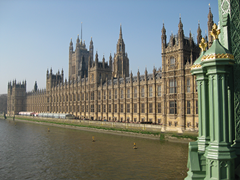Parity and welfare
 Parity keeps benefits at the same level across the UK but gives Northern Ireland flexibility in how they are administered. agendaNi considers its origins and how it works in practice.
Parity keeps benefits at the same level across the UK but gives Northern Ireland flexibility in how they are administered. agendaNi considers its origins and how it works in practice.
Northern Ireland is the only part of the UK where social security, child support and pensions policy is devolved. However, in practice, the province follows the parity principle and adopts the policies set down for Great Britain by the UK Department for Work and Pensions.
Parity ensures that all people receiving benefits are paid at the same level, regardless of their location in the UK. This reflects the fact that tax-payers in Northern Ireland pay income tax and national insurance contributions at the same levels as those in Great Britain.
This convention was established in the 1911 National Insurance Act, which set up two national insurance funds: one for Great Britain and one for Ireland. The Irish fund would be run by the home rule administration in Dublin and ‘topped up’ where necessary by a subsidy from Westminster.
That model was fully implemented in 1922 when Northern Ireland was granted its own national insurance fund. Westminster’s subsidy kept increasing, especially over the Great Depression.
In 1938, Chancellor of the Exchequer Sir John Simon formally agreed to meet any deficit in the Northern Ireland budget unless Stormont increased public spending or lowered taxes beyond the levels in place in Great Britain.
A full social security system for Northern Ireland was established in 1948, again on the basis of parity with Great Britain. Financial dependence on Westminster has meant that the parity principle was since been widely accepted by ministers and officials.
Parity was also affirmed in the Northern Ireland Act 1998, which requires the Executive’s Social Development Minister and the UK Work and Pensions Secretary to consult each other to ensure “single systems of social security, child support and pensions for the United Kingdom.”
Sir John Simon’s arrangement still stands. The Executive is free to break parity and set higher levels of benefits but would have to absorb the financial cost of any changes. Sinn Féin is the only party to advocate a break but it adds that devolving tax-raising powers would close the fiscal gaps.
SDLP social development ministers Margaret Ritchie and Alex Attwood opposed breaking parity but ‘stretched’ parity by lobbying for administrative changes to meet local needs.
For example, the 2007 Welfare Reform Bill proposed direct payments of housing allowance to tenants. However, this was amended to allow for continued payments to landlords in Northern Ireland. MLAs concluded that Westminster’s model would add financial pressure to people on low incomes. The new housing element of universal credit will also be paid directly to landlords.
Nelson McCausland has taken the same approach and has persuaded the UK Government to allow split payments of benefits between couples, twice-monthly (as opposed to monthly) payments to highly vulnerable claimants.
The Scottish Government has called for social security to be devolved alongside tax powers. The UK Government, though, has that proposal as it would “create considerable costs in terms of efficiency, effectiveness, prompt service to customers and, above all, expense.”
If Scotland attained independence, the SNP would consider keeping a common social security system as part of a “social union” between Scotland and the remainder of the UK.
Apart from the nationalist Plaid Cymru party, there is little support for devolving social security in Wales. As with Northern Ireland, the principality is highly dependent on its block grant from Westminster.





